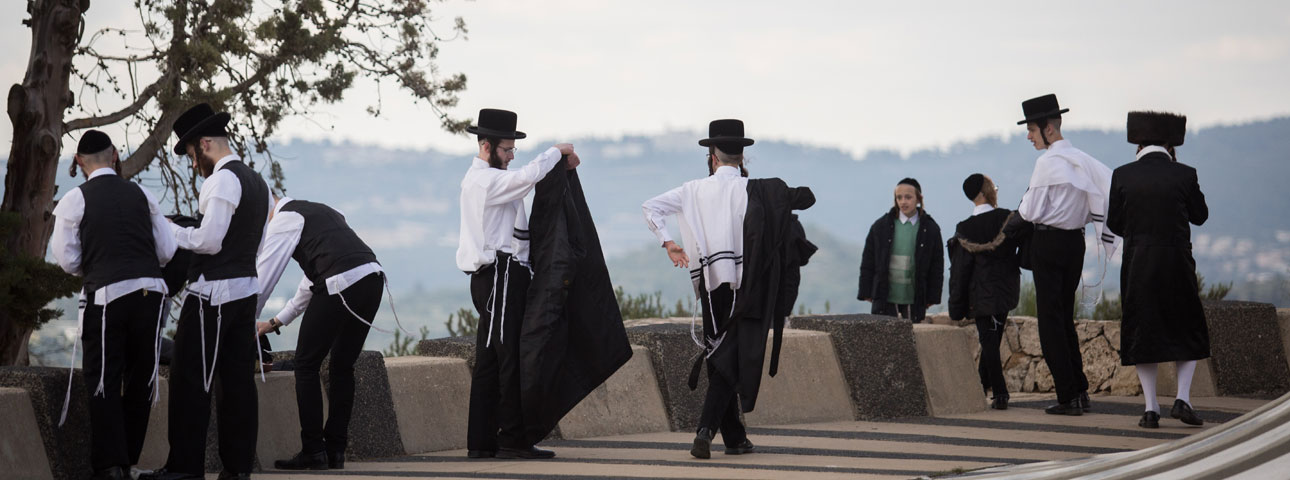Ultra-Orthodox National Civic Service
What is Wrong with the National Civic Service program for the Ultra-Orthodox and How to Reform It?

Illustration | Flash 90
A new study on the National-Civic Service program for the ultra-Orthodox, conducted by Asaf Malchi of the Israel Democracy Institute, reveals the program’s failure at meeting its quantitative, economic, and social goals.
Over the past five years, the number of ultra-Orthodox volunteers for National Civic Service has dropped by two-thirds. In 2017, only 533 volunteered for the program— a number far lower than the targeted f 2,000 new volunteers each year. In other words, the number of new volunteers for this track was approximately one-third of the annual planned target, in contrast with the program for military service for members of the ultra-Orthodox community, which met 90 percent of its recruitment goals.
Annual recruitment targets; actual numbers of recruits; and % of Achievement of Recruitment Targets, 2011–2016
Unlike the sharp and consistent decline in the number of new volunteers for National Civic Service, there has been a clear and consistent increase in the numbers of ultra-Orthodox enlisting in the IDF (in all tracks of military service):
Number of ultra-Orthodox volunteers for National Civic Service as compared with number enlisting in military service
The new study included a survey conducted among 200 graduates of National Civic Service in 2017, and a survey of volunteers for service, conducted among 81 new volunteers. The study was also based upon two focus groups sessions and sixteen in-depth interviews with key officials in the National Civic Service program
Findings indicate that the National Civic Service program fails to achieve its goals of a more equitable distribution of civic responsibility and of the integration of ultra-Orthodox men into the job market.
Benefits to Society
The study showed that approximately 80% of the participants in the National Civic Service program volunteer in non-profits (“third sector organizations”) within the ultra-Orthodox community, and have almost no contact with non-ultra-Orthodox populations. Thus it is not surprising that only 16% of the graduates reported an improvement in their attitude toward the non-ultra-Orthodox population as a result of their service.
Integration into the Workforce
Despite the fact that the volunteers are age 21 and over, and many of them view , volunteer service as a springboard into the workforce, it is all the more surprising to discover that 55% of Service graduates indicated that their service had no effect on their desire to acquire job training or earn an academic degree.
Volunteer service as a springboard for entry into the workforce (% of the total number of graduates)
More than half (55%) the graduates also reported that their service had not provided them with a good springboard into the job market, even though program graduates are required, to attend a workshop preparing them for entry into the job market. Sixty percent of the respondents said that the workshop was of no help to them at all.
Benefits of service and utilization of personal skills as perceived by program graduates
The survey findings indicate that approximately 55% of graduates reported that the program did not provide them with an opportunity to use their abilities to the fullest. Approximately 20% reported that they had made use of their skills “to a fair extent”, while only 25% reported that they had made use of their skills” to a large” or very large extent.
Conclusions and Recommendations
Malchi proposes a “revolution” in the National Civic Service to be achieved by gradually doing away with the option of volunteering in ultra-Orthodox third-sector institutions. This option has proven to fail both in terms of increasing equality in sharing the burden of civic responsibility and in creating meaningful and useful service for the individual.
Instead of this type of service, Malchi recommends that:
• Program participants perform their service exclusively in security and government agencies.
• The IDF or the Ministry of Internal Security should be put in charge of recruiting, managing, and supervising the volunteers.
• Volunteers should be placed only in tracks that report to defense or government agencies such as the Israel Police, the Israel Prison Service, Magen David Adom, and United Hatzalah of Israel (which will be beneficial both to the volunteer and the community, and will ensure the program’s effectiveness).
Background: National Civic Service Program for the Ultra-Orthodox Population
The Administration for National Civic Service for the ultra-Orthodox population was established in the Prime Minister’s Office in 2008 as part of the implementation of the Tal Law, which enabled continued extensions of exemptions of ultra-Orthodox Yeshiva students. As a result of political “deals”, the program became an agency subject to political pressures.
Following a ruling by the High Court of Justice in 2014, it was decided that ultra-Orthodox men aged 21 to 28 whose status was “Torato umanuto” — Torah study was their job — would be recruited to the National Civic Service program for the ultra-Orthodox community as an alternative to military service. Two National Civic Service tracks were created as part of this reform: a civilian-security track and a split track in which volunteers worked primarily in ultra-Orthodox civil society organizations. The ultra-Orthodox in the civilian-security track volunteer 36 hours per week, while the volunteers in the split track volunteer 20 hours per week. Although the stipend is higher in the security service track, the number of participants who volunteer for it remains small.
